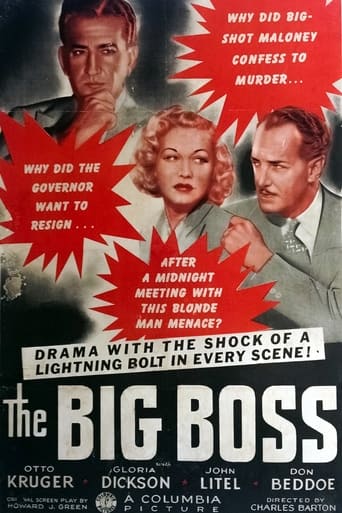mark.waltz
The life of a young intellect is changed forever when he witnesses his sheriff father being killed while trying to stop a lynching. His older, wilder brother couldn't deal with it and took off, but for Bob Dugan (John Litel), this is the stepping stone to great things, and that means going into law to try and change the law for the benefit of society. When the audience meets the grown-up version of this character, he is already a state senator trying to remain on the right side of the political arena, and that means staying out of the clutches of the "big boss" (Otto Kruger) who seems to have his finger in every political pie, and much like Mrs. Lovett's meat pies in "Sweeney Todd", these political pies are filled with the human flesh of those politicians he has come to ride over with his meat cleaver. Litel only agrees to his mentor-ship as long as Litel calls the shots, but of course, you know that Kruger is only stringing him along until he has all the ammunition he needs to take over. The help of an ambitious female reporter (Gloria Dickson) aids Litel in seeing the light about Kruger, and the twists and turns and revelations about Kruger himself end up being an eye-rolling twist that is hard to swallow.In spite of that sudden turn of events in the final reel, the film is truly engaging, almost a poor man's "Mr. Smith Goes to Washington" without that touch of Capra-corn in Jimmy Stewart's performance. The political corruption is totally believable, and this is basically a continuation of Kruger's role in the Columbia film "I am the Law" (1938) where Edward G. Robinson had his legal career manipulated by Kruger's big boss, and later "Power of the Press" (1943) where Kruger was even more ruthless. There's a subtlety in Kruger's big boss performance, and unlike some of the big money men behind today's crop of political cheats and liars, he's sly but charming in his methods to pull victims into his political web. Dickson is an adequate replacement for Jean Arthur as an ambitious journalist, while Don Beddoe adds comic relief as her sidekick. This won't ever surpass "Mr. Smith" as the ultimate political expose of corruption, but if you take it for what it is and overlook the outrageous turn of events, you too might find yourself liking it. After all, the film does have a point to make, and it ends up being very clear, outlandish or not.


